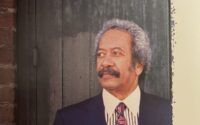Lone Wolf (Act I and II)
There was a time when I wasn’t so good at being alone. During the start of my PhD program (over a decade ago now), I had trouble developing the same kind of social circle I’d found as a teenager and later in my undergrad and master’s programs. In between my Tuesday/Thursday classes, I faced large swaths of time by myself—stretches that felt gaping and bare, absent the color of other people.
It wouldn’t last forever. I would eventually find new friends (a community of local musicians—the very scene that nudged me into music writing), but for two years, I spent the vast majority of my time solo. At first, I fell into a sharp grief at being so suddenly and consummately alone, but like a kind of Stockholm syndrome, I came to prefer it—and eventually to require it. As Hiss Golden Messenger sings on “Biloxi“: “All around my hometown I was known as a loner/ Oh, you know I wasn’t lonely/ I just liked being alone.”
Even as I developed new friendships and folded myself into the fabric of other people, something fundamental had shifted. Sure, I enjoyed company, but I came to prefer my time alone—a fact compounded by my life choices. Never one to properly settle for any length of time, I moved frequently, pursuing new ventures and experiences. Decamping one city to begin again in another inevitably meant spending some period of time on my own—at least for a spell. I’d make new friends over time, but my yen to be alone never diminished.
I started searching out traces of my kind, reading about women who’d never partnered, whose work became their central pursuit, and who lived wild, nomadic existences that caused my heart to pang with recognition. I could join their ranks, choosing writing and solitude and travel and moments—their fleeting, flitting nature more satisfying because it meant, in between, I could carve out pockets of the solitude I so craved.
Somewhere along the way, I came to think of myself as a lone wolf. It was a symbol that felt fitting: I was nomadic by nature, able to pick up and plunk down anywhere new, finding my footing because I didn’t mind being alone until I figured out my place.
I remember one particular night in New Orleans. I sat at Dat Dog on Magazine St., where I often went on Saturdays to watch college football, back when that’s something I did. There was a small cohort of dudes I’d bonded with, all of whom had girlfriends, so it felt like a safe troupe. Or so I thought. One evening, one of the guys—the sloppiest of the bunch—drank too much. He told me how pretty my eyes were and how lucky any guy would be to have me. (Yes, have me.) I scoffed and said, “I’m more of a lone wolf,” my fangs flickering behind my lips, waiting to bite down on his assumptions. It was a designation akin to armor and I brandished it well. Let everyone else partner off and settle down. I was fine going it alone. At least, that’s what I told myself.
Two songs in particular unearth that identity: TV on the Radio’s “Wolf Like Me” and Bon Iver’s “The Wolves (Act I and II).” They share little more than thematic titles, though taken together they could serve as fitting bookends to the lone wolf’s nature, its wrath and woundedness.
“Wolf Like Me,” from the band’s 2006 album Return to Cookie Mountain, is a spinning vortex of a song that, for me, exemplifies the howling need for seclusion that has shadowed my adult years. “Got a curse I cannot lift/ Shines when the sunset shifts/ When the moon is round and full/ Gotta bust that box, gotta gut that fish,” lead singer Tunde Adebimpe declares, like a proclamation. It starts with a growing cacophony: drums structure the opening metallic effect before a thick, distorted synth enters the fray. “My heart’s aflame/ My body’s strained, but, God, I like it,” he sings on the chorus.
I did. I did like it.
On the opposite end of that emotional dervish sits “The Wolves (Act I and II)” from Bon Iver’s 2007 debut For Emma, Forever Ago. The glacial strums of an acoustic guitar build into Justin Vernon’s doubled falsetto. He sings about a lover who has left him in the lurch, the pain reeling in fits and starts throughout the verses before he finds a forceful strum that wends toward a growing cacophony. “What might have been lost/ (Don’t bother me),” Vernon repeats like an intonation. The drums create fireworks around his voice.
The song doesn’t end in that discordant moment, but returns once again to the quiet. Vernon sings in an off-kilter round, “Someday my pain/ Someday my pain, my pain.” The accusation he leveled earlier, “Someday my plan will mark you,” disappears and he’s left with just the gash. Taken together, these songs form a portrait of that part of me—once a nugget and now a landmine—that prefers my own company, that seeks out companionship only as a periodic break from the larger enjoyment of being on my own.
I once needed to learn how to be alone, an exercise that has served me over the years. But at what point does the story become a self-perpetuating myth? Or, rather, that there can be two truths: The truth of enjoying solitude and the truth of wanting someone to share time and space and ideas with. They need not be mutually exclusive, and yet when I’ve ventured from my perch and tried to build a bridge to a relationship, that person has inevitably become threatened by my need to be alone at least some of the time. If I let someone close—let someone in—I don’t trust that they wouldn’t try to take it away from me.
The lone wolf exists still—at times howling and ready to bite, as on “Wolf Like Me,” and at others curled around the thorn in its paw, private and protective, as on “The Wolves (Act I and II).” But perhaps, as with any story we create about ourselves and live within the confines of, there can be a way out of the woods.



